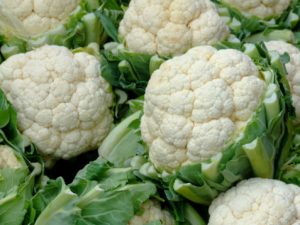Nutritious cauliflower is full of amazing health benefits that help prevent cancer, protects the eyes, and even helps with weight loss. It is one of the top 30 superfood vegetables because it is full of so many health benefits. The Centers for Disease Control and Prevention’s Aggregate Nutrient Density Index have verified this.
Health Benefits of Cauliflower
Check out these many impressive health benefits.
Helpful in Preventing Breast Cancer
A number of studies have shown that cauliflower is very helpful in preventing breast cancer.
Reduces the risk of Lung, Stomach, Colon and Rectal cancer
All the Brassica family which includes cabbage, cauliflower, kale, broccoli, and brussels sprouts helps reduce the risk of these cancers.
Prevents Prostate Cancer
Research at the Rutgers University in New Jersey shows that cauliflower and turmeric are helpful in preventing prostate cancer.
Protects Our Eyes
It has sulforaphane in it which has been found to protect the sensitive tissues in the eyes from oxidative stress that can cause cataracts, macular degeneration, and blindness.
High in Vitamin K for Healthy Blood and Bones
This vegetable is high in vitamin K; which is important for the development of bones and those lacking it have an increased risk of osteoporosis. Vitamin K is also necessary for clot formation. If one is deficient in vitamin K, they will bleed too much after an injury. One cup of chopped cauliflower contains 16.6 mcg of vitamin K.
Helps Protect the Skin
The sulforaphane in cauliflower is helpful in protecting the skin against the damage caused by ultraviolet radiation according to research studies.
Good for Weight Loss
It is exceptionally low in calories (29 calories per cup), has no fat, and is very low in carbs and sugar. It is full of fiber making it a very filling food.
An increase in eating non-starchy vegetables such as cauliflower was found to be linked to weight loss.
Great for Digestion and Detoxing
The bacteria in the gut were positively improved by adding of cruciferous vegetables to the diet. We need good bacteria for digestion. Also, cruciferous vegetables are beneficial for detoxification because of their rich supply of sulfur-containing compounds called glucosinolates, which support proper nutrient absorption and toxin and waste removal.
Cauliflower is nothing but a cabbage with a college education.” – Mark Twain
Cauliflower Nutrition
It is a great source of vitamin K, thiamin, riboflavin, niacin, magnesium, phosphorus, fiber, vitamin B6, folate, pantothenic acid, potassium, and manganese. The good news is that 1 cup only has 29 calories!
Please Note:
Digestive issues including gas: Often people find it difficult to digest raw cruciferous vegetables. If you cook them it helps with digestion because the carbohydrates in these vegetables are not able to get broken down completely in the digestive tract.
Thyroid Concerns: Research has shown that a very large quantity of cruciferous vegetables can cause hypothyroidism and this risk only exists for those who have an iodine deficiency. A study found that those who ate 5 oz a day of cooked Brussel sprouts for four weeks had no adverse effects on thyroid function. If you have a thyroid problem, eat only cooked cruciferous vegetables and do not have more than 1-2 servings daily.
Kidney Stones or Gout: The cruciferous vegetables contain purines, which can sometimes break down to form uric acid in the urine. Those who have kidney stones and gout should speak with your doctor before eating large amounts of cauliflower. Usually, small amounts are not a problem.
Cauliflower History
- Its history dates back to over 2,000 years in the northeastern portion of the Mediterranean where it is thought to be native in Turkey.
- It is not as popular in North America as it is in other parts of the world.
- China and India produce 74% of the world’s cauliflower.

Cauliflower Trivia
- The curd, heart or head of the cauliflower is the white portion of the plant.
- It also comes in green, orange, brown, yellow and purple varieties.
- The Broccoflower is a newer member of the family, a cross between broccoli and cauliflower.
- A descendant of the wild cabbage, it belongs to the family of Cruciferous vegetables. Cruciferous vegetables received their name because they have four petals that grow in the shape of a Greek cross.
Purchase the Best
Purchase it with tightly packed clusters that are not separated. Do not purchase if it is spotted or dull color. Look for heads that are surrounded by several thick green leaves and check for the quality, not the size. There are many types of cauliflower that are all very nutritious (orange, purple, yellow, and green).
How to Store Cauliflower
It is best to use it within three to seven days after purchasing to be certain its nutrients are all still complete. Store it with the stem side down, to stop moisture from developing in the floret clusters.
Tips for Cooking Cauliflower
Don’t overcook as it destroys most of the vitamins and nutritional content and is linked with a sulfur-like smell. Health benefits are reduced by 75% when cooked for thirty minutes or more.
It is best to steam it as it improves the bile acid binding it and may be healthier than eating it raw.
You can even eat the leaves and stems which are great for soup stock.
Try these delicious recipes:

Yummy Grain-Free Stuffing with Cauliflower and Mushrooms – This grain-free stuffing is so delicious that even those who think they have to have a bread stuffing enjoy it.
Roasted Brussels Sprouts with Pecans and Cranberries – This is an exceptionally tasty dish fit for a celebration meal.
Broccoli Rice Salad– A filling and healthy salad that is easy to make.
100+ Superfoods
Learn more about some of the healthiest vegetarian foods you will always want to have in your pantry or growing on your deck.
READ: Superfoods – Over 100 of the Healthiest Foods You Should Have in Your Diet and learn more about the variety of Superfoods we think you should have in your diet.


Cauliflower rocks!
One of my favorite recipes is a Cauliflower Parmesan recipe my GF prepares 🙂